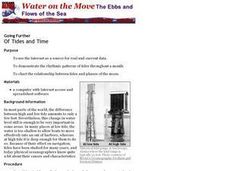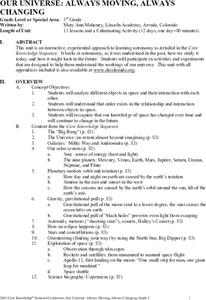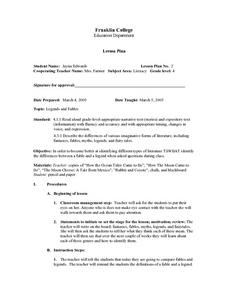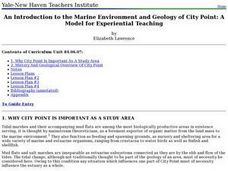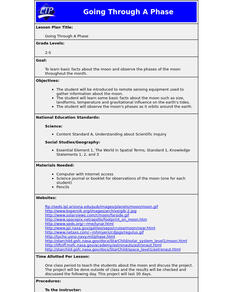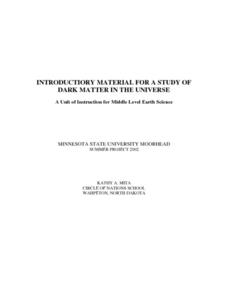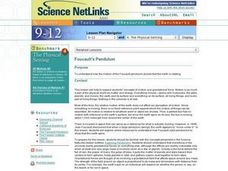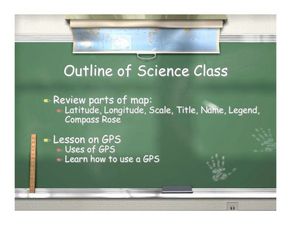Scholastic
Study Jams! Tides
The tide will turn in your earth science or oceanography unit when viewers see this clip. They learn that tides are caused by the gravitational pull of our moon, and are even impacted by the gravity of the sun. High, low, neap, and...
It's About Time
The Earth-Moon System
Explore the earth-moon system with blossoming astronomers in this fun-filled activity. They begin by investigating lunar phases and differentiating between each. They continue the activity by learning about tidal forces and how these are...
Mr. E. Science
The Earth in Space
Do you think Earth makes fun of other planets for having no life? The presentation covers the rotation and revolution of both the earth and our moon. It provides explanations for seasons, tides, and eclipses. Lesson is the 20th in a...
Curated OER
Of Tides and Time
Students use the internet to research how the time of day affects the tides. They work together to develop a demonstration of the tide patterns for a month. They create a chart showing the relationship between tides and the phases of...
Curated OER
The Tides-Ups and Downs
Students investigate tidal patters and the forces that cause the tides. In this tidal lesson plan, students explore and research the tides and complete 43 questions about the causes of the tides, how they are monitored and measured and...
Curated OER
Gravity: A Relatively Heavy Subject
Students examine planetary movement and its relation to the tide.In this gravity lesson students describe how and why the high and low tides change every day.
Curated OER
Ups and Downs
Students examine tidal currents. In this tides lesson students describe how the tides affect lives and explain why it is important to monitor them.
Curated OER
Astronomy
Students complete a unit of lessons on our solar system, its stars, and astronomers. They record information in a space journal, design constellations, define key vocabulary, observe the phases of the moon, and create a group planet...
Curated OER
Observing and Sketching the Lunar Surface
Learners explore space science by conducting an illustration activity. In this lunar lesson plan, students discuss what the moon is and the role it plays for our environment on Earth. Learners view images of the moon and utilize chalk to...
Curated OER
Science Videos
Students plan, practice, and act in a 2-3 minute videotaped production about a specific topic. Students from a local high school give presentations pertaining to seasons, earth rotation, and moon phases. Students analyze the...
Curated OER
Our Universe: Always Moving, Always Changing
Students explore the main concepts of astronomy through the eleven lessons of this unit. The past, present, and future methods of studying the science are examined in this unit.
Curated OER
Legends and Fables
Fourth graders identify and discuss the differences between legends and fables. They define fable and legend, then as a class take turns reading our books. Students select two of the stories, and complete a Venn diagram, comparing one...
Curated OER
An Introduction to the Marine Environment and Geology of City Point: A Model for Experiential Teaching
Students begin the lesson by researching the history of City Point, Connecticut. Using a map, they color areas they were asked to find and discuss why the areas are important to the community. As a class, they are shown recent slides...
Curated OER
Going Through A Phase
Young scholars are introduced to remote sensing equipment used to gather information about the moon. They learn basic facts about the moon such as size, landforms, temperature and gravitational influence on the earth's tides.
American Museum of Natural History
What is Marine Biology?
A marine environment covers the majority of the earth but is arguably the least understood. Teach young scientists about the characteristics of oceans and ocean species using an interactive online lesson. The in-person or remote learning...
Curated OER
Dark Matter In The Universe
Learners investigate the concept of dark matter and how it occurs in the universe. They conduct research using a variety of resources. Students use the information by reading at least two articles about dark matter. They also generate...
Curated OER
Foucault's Pendulum
Students investigate how the motion of the Foucault pendulum proves that the Earth is rotating. They research the Internet about pendulums and conduct an experiment online. They view a multimedia presentation about pendulums and read...
Curated OER
Lesson on GPS
Students investigate global positioning systems. In this technology and mapping lesson, students view a PowerPoint presentation in which they identify the features of a GPS, state its uses, and follow steps to find a waypoint.
Curated OER
Space, the Final Frontier...
Students study a common theory on how the solar system was formed and examine the relative scale of the size and distances among the bodies of the Solar System.
Curated OER
Annabel Lee
In this poems worksheet, learners read a poem about Annabel Lee and complete multiple choice questions and a word search. Students complete 2 activities.
Curated OER
Gravity
Sixth graders explore the characteristics of gravity. They discuss gravity on Earth and then use cereal boxes to research and compare the weight of objects on Earth to the weight of those objects on other planets.
Curated OER
How Often?
In this social studies worksheet, students answer 24 questions about a variety of social studies questions. Students are divided up into two teams and the first team to answer a question correctly gets a point.
Curated OER
Japanese Internment and Korematsu v. US
Students study the internment camps and the trials of the Nisei. They compare the post-Pearl Harbor US with post-9/11 US and evaluate the decision of Korematsu v. US. They synthesize the material and write an assent/dissent opinion on...
Other
Bad Astronomy/phil Plait: Tides and Why Our Days Are Getting Longer
Why does the Moon always shows the same face to the Earth? Why is the Moon's rotation period the same as the length of time it takes to orbit the Earth? Why are there two tides a day? These questions and more are answered here.





